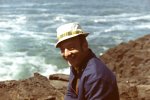
So Empire as a Way of Life was already a farewell song. It came just at the close of that short period of postwar history during which the political mood of mainstream America could permit critical reflections on premises, judgments, and results. Even timid and defensive thinking was temporarily ready - or forced - to pay attention to radically critical interpretations. But this lasted only half a decade. Then came Ronald Reagan and his "neo-conservative" collaborators in the culture industry. They objected to the very idea of contrition. In its place, they offered to the masses the rhetoric of national revival; and to the intellectuals a retread version of that old saw, "America is certainly not the best of all possible, but in fact the best of all known worlds." Revisionism was left a place in this new pluralistic America. However, this pluralism was being redefined, and along postmodern lines. Every last thing was now tolerated - the contradictory, the painful, the profound, the sad, the significant, the disturbing. Thus revisionism along with all else was dissolved and finally converted into yet another banal smile-button piety [zu einer banalen Botschaft aufgekratzter Alltäglichkeit].
These are bad times for radicals, much worse than the periods of outright condemnation and intimidation. Williams in the later part of his life was not optimistic regarding the possibilities for understanding and reform among the political elites of his land. It was for this reason that he turned to decentralizing schemes that would remove the power of the bureaucracy in Washington over the regions. Only in this way could the national power elites be prevented from automatically seeking solutions to domestic problems by creating new "frontiers" overseas. He cherished the combination of social concern and democratic values that he had found in that corner of the country into which he had withdrawn, the Pacific Northwest. It was there during the last phase of his professional career that he found a home and community in which to spend his final years. He imagined the Northwest as an independent republic, emancipated from the chase after new borders, freed from the "Power Elite" of the great capitalist corporations and also from Washington's Politbureaucracy. As for the chances for transforming this last dream into reality, he had no illusions. He just wanted to have said it.
William Appleman Williams died, after a period of suffering from a severe illness, on the fifth of March of this year [1990] at his home on the Pacific Coast, in Waldport, Oregon. His ashes, as he had wished, were scattered over the ocean. His writings will remain a source of instruction for all - regardless of ideological differences - who wish to learn from those few who are both incorruptible and have a head of their own.
Table of Contents
- On Academic Discourse and the Search for Truth
- Father of the Revisionist School
- The Open Door at Home
- A World Power Against its Will
- Transferring the Frontier Overseas
- An Unheard-Of Provocation
- From Corpus Christi to Madison
- Williams the Teacher
- Unexpected Icons
- Into the Mainstream, Briefly
- A Farewell Song


